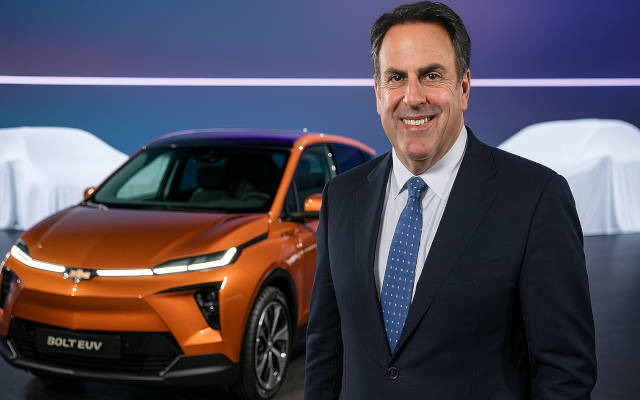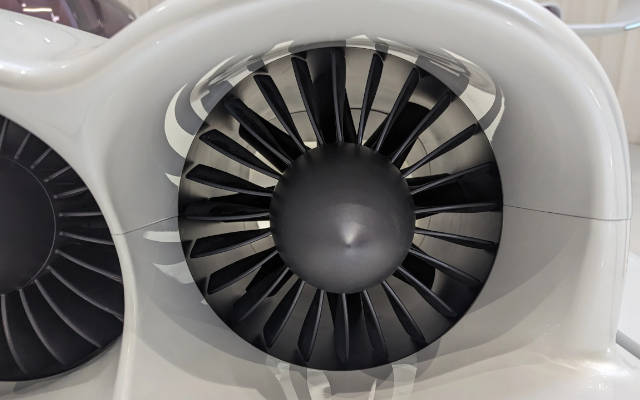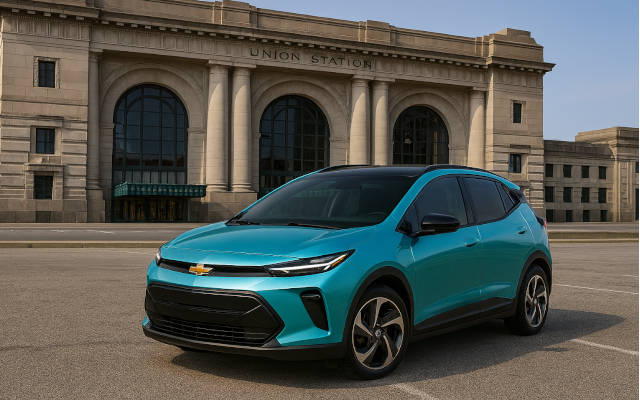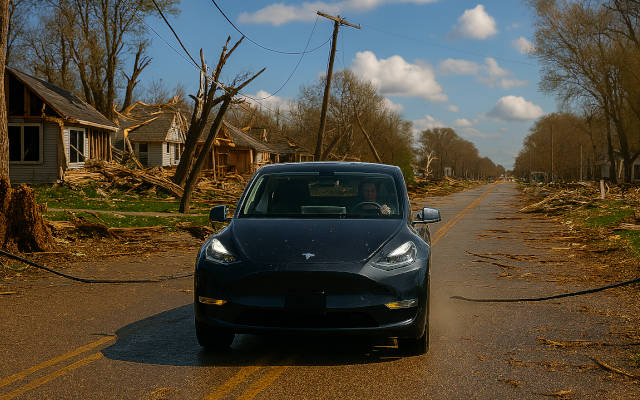 EDITOR'S PICK
EDITOR'S PICK
GM CEO: Automaker Planning Entire Affordable EV Range
21 Oct 2025 | Synopsis
 GM President Mark Reuss confirmed a new family of affordable Chevrolet EVs launching by 2027, starting with a redesigned Bolt. Built on GM’s Ultium platform, the lineup will offer improved range, lower costs, and broader appeal. Reuss emphasized GM's commitment to mainstream electrification, with multiple models planned to follow the Bolt. The goal: make EVs accessible without sacrificing performance or utility.
GM President Mark Reuss confirmed a new family of affordable Chevrolet EVs launching by 2027, starting with a redesigned Bolt. Built on GM’s Ultium platform, the lineup will offer improved range, lower costs, and broader appeal. Reuss emphasized GM's commitment to mainstream electrification, with multiple models planned to follow the Bolt. The goal: make EVs accessible without sacrificing performance or utility.Norway's Ferry Operator Norled Could Have Saved Money & Staff by Skipping Hydrogen
21 Oct 2025 | Synopsis
 Norway's ferry operator Norled lost €85M after investing in hydrogen ferries like MF Hydra, which cost more to build and operate than battery-electric or diesel alternatives. Hydrogen fuel is expensive, inefficient, and emits more CO2 than expected - double that of diesel and 40x more than electric. Battery ferries like MF Nesvik prove cheaper, cleaner, and more practical. Critics say Norled's hydrogen gamble cost jobs and failed to deliver strategic value.
Norway's ferry operator Norled lost €85M after investing in hydrogen ferries like MF Hydra, which cost more to build and operate than battery-electric or diesel alternatives. Hydrogen fuel is expensive, inefficient, and emits more CO2 than expected - double that of diesel and 40x more than electric. Battery ferries like MF Nesvik prove cheaper, cleaner, and more practical. Critics say Norled's hydrogen gamble cost jobs and failed to deliver strategic value.Archer Beats Out Joby for Lilium eVTOL Patents
20 Oct 2025 | Synopsis
 US-based Archer Aviation acquired 300 patents from bankrupt German eVTOL firm Lilium for $21M, beating Joby, its competitor. The deal includes ducted fan tech, aircraft design, and battery systems. Archer plans to expand beyond air taxis into cargo, defense, and sport aviation. Lilium's collapse reflects broader industry consolidation, as well-funded players absorb assets from struggling startups. Lilium spent more than $1.5 billion developing these technologies.
US-based Archer Aviation acquired 300 patents from bankrupt German eVTOL firm Lilium for $21M, beating Joby, its competitor. The deal includes ducted fan tech, aircraft design, and battery systems. Archer plans to expand beyond air taxis into cargo, defense, and sport aviation. Lilium's collapse reflects broader industry consolidation, as well-funded players absorb assets from struggling startups. Lilium spent more than $1.5 billion developing these technologies.Rebooting the 2027 Chevy Bolt Was More Complex Than You'd Think
20 Oct 2025 | Synopsis
 The 2027 Chevy Bolt retains its familiar look but features a nearly complete electrical overhaul. Built on GM's Global B architecture, it supports OTA updates and advanced driver aids. It uses LFP batteries for ~255 miles of range and 150kW fast charging (10–80% in 26 minutes), plus Tesla's NACS port. Production shifts from Michigan to Kansas, reusing body tooling to cut costs. Target price is under $30K, with deliveries starting January 2027.
The 2027 Chevy Bolt retains its familiar look but features a nearly complete electrical overhaul. Built on GM's Global B architecture, it supports OTA updates and advanced driver aids. It uses LFP batteries for ~255 miles of range and 150kW fast charging (10–80% in 26 minutes), plus Tesla's NACS port. Production shifts from Michigan to Kansas, reusing body tooling to cut costs. Target price is under $30K, with deliveries starting January 2027.A Power Outage Means You Can't Charge Your EV: What Do You Do?
20 Oct 2025 | Synopsis
 If your power goes out, your home EV charging stops - but so do gasoline pumps, so you’re not at a unique disadvantage. Most outages are short: the average US user experienced under six hours of interruption in 2023. To prepare, keep your EV topped up (rather than waiting until very low), know public DC and Level-2 charging stations within about 25–50 miles, and if you have a generator, wiring for at least a trickle charge helps.
If your power goes out, your home EV charging stops - but so do gasoline pumps, so you’re not at a unique disadvantage. Most outages are short: the average US user experienced under six hours of interruption in 2023. To prepare, keep your EV topped up (rather than waiting until very low), know public DC and Level-2 charging stations within about 25–50 miles, and if you have a generator, wiring for at least a trickle charge helps.
 EVWorld Exclusive
EVWorld Exclusive
Unlocking Heat's Hidden Potential: How a Nanoscale Discovery Could Transform Everyday Tech
24 Oct 2025 |  A recent nanoscale physics breakthrough reveals heat can transfer across tiny gaps far more efficiently than expected - up to 100 times greater than classical predictions. This could revolutionize cooling and energy systems in electronics, EVs, and smart appliances. While engineering challenges remain, early applications may emerge within 3-5 years, with broader consumer adoption possible in the next decade. The future of heat management may be silent, solid-state, and radically efficient.
A recent nanoscale physics breakthrough reveals heat can transfer across tiny gaps far more efficiently than expected - up to 100 times greater than classical predictions. This could revolutionize cooling and energy systems in electronics, EVs, and smart appliances. While engineering challenges remain, early applications may emerge within 3-5 years, with broader consumer adoption possible in the next decade. The future of heat management may be silent, solid-state, and radically efficient.
Turning the Energy Crunch into a Smart Grid Revolution
24 Oct 2025 |  America's energy crunch is not about supply - it's about coordination. Virtual power plants and vehicle-to-grid systems offer a scalable, software-driven solution to rising demand from AI, EVs, and climate volatility. By turning homes, vehicles, and businesses into active grid assets, and aligning policy with technology, the U.S. can build a smarter, more resilient energy future without building more power plants. The tools exist - now it's time to connect them.
America's energy crunch is not about supply - it's about coordination. Virtual power plants and vehicle-to-grid systems offer a scalable, software-driven solution to rising demand from AI, EVs, and climate volatility. By turning homes, vehicles, and businesses into active grid assets, and aligning policy with technology, the U.S. can build a smarter, more resilient energy future without building more power plants. The tools exist - now it's time to connect them.
Auto Retail in 2025: Bridging the Trust Gap Between Dealers and Buyers
24 Oct 2025 |  The 2025 Urban Science and Harris Poll report reveals a growing disconnect between dealers and buyers. While dealers embrace EVs, AI, and digital tools, many buyers remain cautious - especially about full electrification and online-only retail. Brand loyalty is weakening, and policy clarity is key to adoption. The future of auto retail depends on bridging trust, flexibility, and infrastructure gaps.
The 2025 Urban Science and Harris Poll report reveals a growing disconnect between dealers and buyers. While dealers embrace EVs, AI, and digital tools, many buyers remain cautious - especially about full electrification and online-only retail. Brand loyalty is weakening, and policy clarity is key to adoption. The future of auto retail depends on bridging trust, flexibility, and infrastructure gaps.
Electric Icons in the Making: Audi Concept C vs. Chevrolet Corvette EV
23 Oct 2025 |  Audi's Concept C previews a refined electric GT built on the mature PPE platform, likely arriving by 2026. Chevrolet's Corvette EV promises supercar performance but faces packaging and thermal challenges. Audi is closer to production; Corvette remains in early development. Both reflect divergent strategies in electrifying legacy sports cars, with Audi emphasizing platform maturity and Chevrolet pursuing brand continuity through engineering innovation.
Audi's Concept C previews a refined electric GT built on the mature PPE platform, likely arriving by 2026. Chevrolet's Corvette EV promises supercar performance but faces packaging and thermal challenges. Audi is closer to production; Corvette remains in early development. Both reflect divergent strategies in electrifying legacy sports cars, with Audi emphasizing platform maturity and Chevrolet pursuing brand continuity through engineering innovation.
Electrification Is Not an Oversimplification
23 Oct 2025 |  Despite critiques that the quest for global electrification is "simplistic", the transition is strategic and necessary. Grid upgrades, battery innovation, and tailored policies make electrification viable. Sodium-ion batteries and recycling reduce material risk. Compared to fossil fuels, electrification offers cleaner, safer, and more resilient systems. Complexity demands better design - not delay.
Despite critiques that the quest for global electrification is "simplistic", the transition is strategic and necessary. Grid upgrades, battery innovation, and tailored policies make electrification viable. Sodium-ion batteries and recycling reduce material risk. Compared to fossil fuels, electrification offers cleaner, safer, and more resilient systems. Complexity demands better design - not delay.
 24 Oct 2025 21:28:29 UTC |
RECENT PODCASTS
What Battery Chemistry Wins - Ontario Nuclear Investment - Battery Storage Boom
SEARCH RSSTREAM
 57 New Postings In Past 24 Hours
57 New Postings In Past 24 Hours
Category:mobility
Region:NoAmerica
Date:24 Oct 2025
Category:mobility
Region:NoAmerica
Date:24 Oct 2025
Category:mobility
Region:NoAmerica
Date:24 Oct 2025
Category:mobility
Region:NoAmerica
Date:24 Oct 2025
Category:finance
Region:NoAmerica
Date:24 Oct 2025
Category:mobility
Region:NoAmerica
Date:24 Oct 2025
Category:finance
Region:NoAmerica
Date:24 Oct 2025
Category:finance
Region:NoAmerica
Date:24 Oct 2025
Category:mobility
Region:NoAmerica
Date:24 Oct 2025
Category:mobility
Region:AsiaPacific
Date:24 Oct 2025
Category:mobility
Region:AsiaPacific
Date:24 Oct 2025
Category:mobility
Region:AsiaPacific
Date:24 Oct 2025
Category:finance
Region:NoAmerica
Date:24 Oct 2025
Category:finance
Region:AsiaPacific
Date:24 Oct 2025
Category:mobility
Region:AsiaPacific
Date:24 Oct 2025
Category:energy
Region:IndoAsia
Date:24 Oct 2025
Category:mobility
Region:IndoAsia
Date:24 Oct 2025
Category:review
Region:AustralPacific
Date:24 Oct 2025
Category:mobility
Region:Europe
Date:24 Oct 2025
Category:mobility
Region:NoAmerica
Date:24 Oct 2025